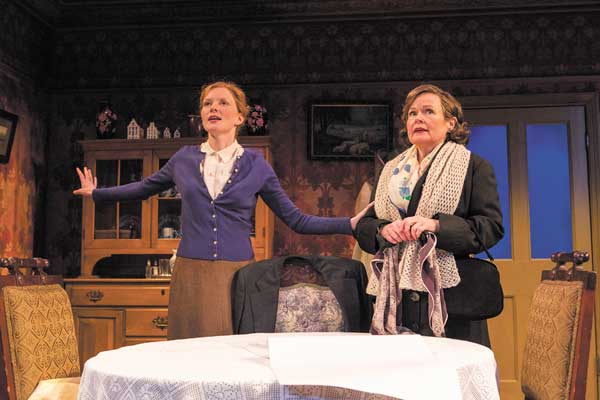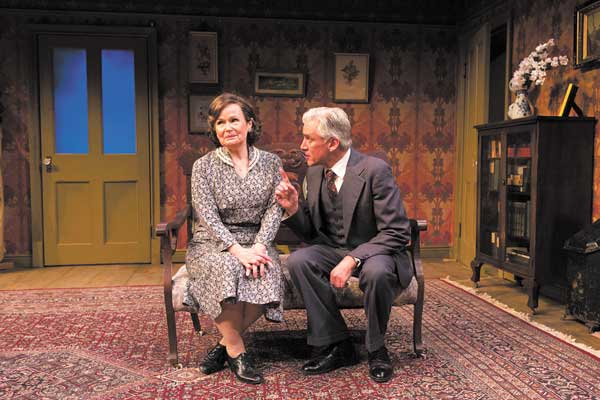
Wrenn Schmidt (as Katie Roche) and Margaret Daly (as Amelia Gregg).
BY JERRY TALLMER | For Teresa Deevy, playwright, born 1894, the sounds of silence were everywhere.
For Katie Roche, house worker, not yet twenty years old — lovely, impatient, illegitimate Katie of little Lower Ballygar, Ireland — the temptations to greatness, particularly the call of the convent, were everywhere. But none of it went anywhere.
Mint Theater champions rediscovery of playwright Teresa Deevy
The youngest of thirteen children, Teresa Deevy of Waterford, Ireland, on course to become a teacher, had been walloped by Ménière’s disease while at University College, Dublin — a turn of affairs that left her stone deaf for life.
She went to London to study lip reading because of her deafness — and instead fell into the clutches of Theater, also for life. Indeed, not starting until her mid-30s, she became a most prolific playwright in a land of such phenomena, and though periodically dropping out of sight, or overlooked, she was always rediscovered through the years — including one stretch, 1930-1936, in which the Abbey, Dublin’s revered National Theater, mounted six of her works (including the one that New York’s own superb little Mint Theater Company is bringing to 311 West 43rd Street through March 31).
It caps the Mint’s three-year Teresa Deevy project, the two previous entries being her “Wife to James Whelan” (2010) followed by “Temporal Powers” (2011), a drama that stirs together poverty, peasantry, crime, bad marriage and — a favorite Irish subject — the rights and wrongs, or wrongs and wrongs, of being an informer.
An actress named Wrenn Schmidt, who first worked at the Mint in that exploration of “Temporal Powers” — after breaking in with Charlotte Moore and Ciaran O’Reilly’s great little Irish Rep on West 22nd Street — is the exquisite but ultra-confused Katie Roche of this one.
Should she go into that convent to care for abandoned children and thus seal off her life — her dreams of grandeur — forever?
Should she give in — give herself in marriage — to Stanislaus Gregg (Patrick Fitzgerald), the buttoned-up, buttoned-down home-grown village architect more than twice her own age and stuffiness?
STANISLAUS: Would you think of marrying me?
KATIE: Now, is it? Or then?
STANISLAUS: Now.
So she does. But in due course:
STANISLAUS; There’s a good child.
KATIE: Child? I am your wife that you married.
STANISLAUS: Then do what you’re told! Keep out!

Okay, then — should she fool around with dashing young Michael Maguire (John Fletcher), who sneaks a kiss onto her whenever Stanislaus isn’t in the room? And once too often when he is?
Worse yet, should she spend her life in repentance for all the sins nailed onto her by weird old Holy Reuben (Jamie Jackson) — the staff-clomping cross-country walker from Dublin who reads the riot act to any and all mankind (even more so, womankind)?
Or should she say the deuce with all of them and go for the grandeur that is in her blood, as the out-of-wedlock daughter of the late and dashing Maurice Fitzsimon, seducer of Katie’s beautiful mother who died in childbirth bearing her?
“The world is a very flat place” is what Katie finally, bitterly concludes — although neither actress Wrenn Schmidt, who speaks those words, nor Jonathan Bank, the Mint Theater and this show’s director, will agree with me. About the bitterness, I mean. They see hope.
All of this is — as Hemingway taught us — not in, but between the lines; the silences between the tears and cheers and jests of a tiny rural community rooting for their own lads in the annual Regatta, or river-rowing contest. A whole worrisome scene spins on the borrowing of a long wooden bench to stand on to watch the race.
Teresa Deevy left us in 1963. This month, the Mint is bringing out a printed edition of the three plays of hers that it has now mounted, plus some other, shorter, works.
To Jonathan Bank, Katie at the end “has hit rock bottom in suffering” as she’s dragged off, terrified, to the big city, Dublin, but is also elated, excited, exultant to leave the place where she was born.
“I’ve had my own illusions of grandeur since I was seven or eight,” says slim, finespun Wrenn Schmidt, who was born on a February 18 of some year or other, and arrived in New York from Lexington, South Carolina in 2005, to work at the Bond Street Theatre on Bond Street in the East Village. For Irish Rep, she did John B. Keane’s “Sive” and Eugene O’Neill’s “Beyond the Horizon.” In between and since, a lot of television.
Both she and Bank have, yes, been to Ireland — she to study at Trinity College, he to meet with some grand-nieces and nephews of Teresa Deevy. They brought forth for his benefit a suitcase full of Deevy’s unpublished manuscripts.
The Abbey’s most famous female playwright and story-teller, was James Joyce’s angel, Isabella Augusta, Lady Gregory (1852-1932). “I was just curious,” says Jonathan Bank, “as to why there were not many female Irish playwrights in Lady Gregory’s footsteps.”
And found Teresa Deevy.
“She was not an unknown person at all,” says Bank, “but by the time she died she was pretty much forgotten.”
The Mint Theater Company remembers.
THEATER KATIE ROCHE
Written by Teresa Deevy
Directed by Jonathan Bank
Through March 31
Tues.-Thurs. at 7pm, Fri. & Sat. at 8pm
Sat. & Sun. at 2pm
Special 2pm matinee Wed., March 20th at 2pm
No performance March 19
Running time: 2 hours, 25 minutes
At the Mint Theater
311 West 43rd St., 3rd floor
(btw. 8th & 9th Aves.)
For tickets ($55), call 866-811-4111 or visit theatermania.com
Also visit minttheater.org

















